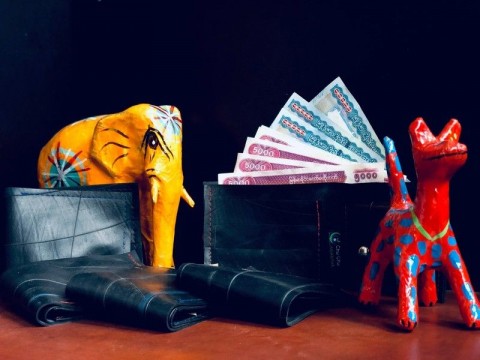Supporting local communities while looking at rebuilding business coming out of this pandemic
This pandemic has just shown us once more how big our responsibility is towards the people we work with in the tourism industry: from full-time tourism business staff to freelance guides and drivers, as well as small locally owned businesses or NGOs or the communities which are regularly visited by tourists. Without being able for visitors to visit destinations and without being able to provide income for the local stakeholders, they are the ones suffering the most. Unfortunately, the support systems from local governments are very limited in many developing destinations, especially for any informal or freelance workers. But products and services really depend on local communities and local guides, they are making the tours what they are and it's very difficult to see them suffer right now.
Khiri Travel Myanmar used the last couple of months to create two projects, which support local communities and create alternative sources of income. Both projects were developed by local staff, who understand the situation in their home country best and who wanted to find a way to support the people in need.
The first project is called Honey Bee Arts & Crafts. In many of the communities usually visited by tourists, we can find extremely talented artisans. They produce beautiful crafts and souvenirs, showing the local culture and using traditional materials. So without any tourists visiting, they don't have any source of income. The Khiri Myanmar team started putting together an online platform, providing an opportunity for local craftsmen to sell their products worldwide and for free. So instead of bringing the tourists to the products, the idea was to bring the products to the tourists. The team obviously has a very good understanding of western clients and their taste. And their knowledge was shared with the local producers by connecting communities with well-known designers so that they could collaborate. There was also an in-depth discussion about environmentally friendly materials so instead of using anything which could harm the ecosystem, all products are now made out of more sustainable, but still traditional options: you find bamboo, papier mâché, recycled plastic, or coconuts. The project goes one step further as well: products are offered directly to travel agents overseas. So if an agent wants for example face masks produced with their logo, they can be ordered directly from them community and the profits go back to the actual producer.
The second project is called Ku Mel, which means "We will help" in English. Again, this project was an idea from the staff of Khiri Travel in Myanmar, looking at the current situation: And they realized importance of volunteers. Many local projects and NGOs can't afford to hire full-time staff or pay for the expertise they need. At the same time, many young Burmese are looking to gain more work experience and develop their skills further, when educational programs might be lacking. KuMel is a free platform, connecting organizations and volunteers. The Khiri team works with many local NGOs and communities, so they have a vast network of partners and a good understanding of their needs. They used that knowledge to create a database of projects, which is shared with anyone enthusiastic about helping out. And there's already a huge selection of projects available: You can find projects working on waste management, tree planting, or in animal shelters. Other vacancies are at a mobile soup kitchen for people in need, or at projects supporting the elderly or people with disabilities.
Both these projects found a way to create additional income or much needed support for communities in need. The local teams developing these projects have worked extremely hard on the execution. There was a lot where they had to learn themselves, for example setting up a website or starting a fundraising campaign. They used this time not only to support communities in need, but also to develop their own personal skills too. They take ownership of the projects and are extremely proud of what they have achieved and how they are able to support their home country.
